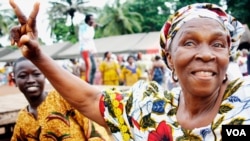DAKAR —
Guinean President Alpha Condé fired 11 government ministers in an unexpected reshuffling of his cabinet on Friday, removing the last remaining members of a military-linked government as part of the West African country's transition to civilian rule.
“In forming a government that is entirely civilian, President Condé sends a strong signal of the normalization of Guinea," read a statement from Condé's office reported by The Associated Press.
But Guinea, which was slated to hold legislative elections within six months of the historic December 2010 presidential poll that put Condé in office, has been politically deadlocked, leaving citizens unable to elect regional representatives.
Many Guineans say electing a parliament would go a long way to reducing tension that has prevailed for months, not least because many donors and investors are holding back until free and fair legislative elections take place.
Even European Union officials have said the delay is threatening more than $180 million in aid for roads and urban development projects, along with security sector and judicial reforms.
Aboubacar Sayon Fofana, a university student in Conakry, says ongoing conflict between the country's main ethnic groups is directly linked to pending elections: President Condé is Malinké and the main opposition leader is Peul.
"Once Guinea holds a free and transparent legislative poll," says Fofana, "stability will return."
A question of transparency
For the opposition, however, “free and transparent” is precisely what is at issue. While officials in Conakry say they are doing all they can to ensure polling fraud would be impossible, opposition leaders say the Condé government is looking to manipulate the process to win a majority in parliament.
Although the opposition welcomes Condé's recent changes to the leadership and makeup of Guinea's independent electoral commission, major hurdles and a deep mistrust remain.
To this day, supporters of Cellou Dalein Diallo, a former prime minister and Condé’s opponent in the 2010 presidential run-off, insist Condé stole the election, a sentiment that fuels hostility toward his administration. The absence of an elected legislature only exacerbates their concerns about an over-concentration of power in the executive office.
"While recent changes in the electoral commission show progress, two problems remain: controversy over the corporation that will manage voter lists and disagreement over the right of Guineans abroad to vote," says Diallo.
According to Elizabeth Côté of the International Foundation for Electoral Systems (IFES), handling of voter lists and other such matters should be squarely in the hands of the independent electoral commission.
"Guinea has been fighting for an independent election commission since the mid-90s, [and] now that it has one and it's in the constitution and its role is very clear, it's time for them to accept that," she says, indicating Guinea’s political class is still learning what it means to entrust its elections to a fully independent institution.
"The whole concept of independence hasn't been weighed by most of the people who have been requesting this commission to exist," she adds. "This whole concept of independence is very important. This cannot happen overnight. It might take generations."
Lacking dialogue
Beyond work of the electoral commission, though, international observers say the entire electoral process needs buy-in at the highest levels on both sides, something that, for now, appears to be a ways off.
Diallo, for example, has pointed to the absence of a direct, formal dialogue between government officials and his opposition leadership.
According to Vincent Foucher, International Crisis Group's senior analyst for West Africa, lack of a high-level dialogue and consensus will present difficulties even if an arrangement to hold elections is reached.
"There are militants and radicals on both sides that are not willing to compromise, and there will be incidents," says Foucher. "If there is no high-level consensus these will probably be much worse and much more worrisome and more consequential for the stability of Guinea.”
But, he adds, given Guinea's history of political violence, ethnic divisions and abuses by security forces, the country has made important strides.
“The 2010 presidential elections were the first really competitive elections ever in the history of Guinea," he says. "Some countries have had it for years — like Senegal or Benin, they have experience with that — Guinea is just discovering it."
This week, Guinea’s government and the opposition are working to finalize the membership of the electoral commission. Observers say the earliest legislative polling could take place would be in the first quarter of 2013.












